Results
-
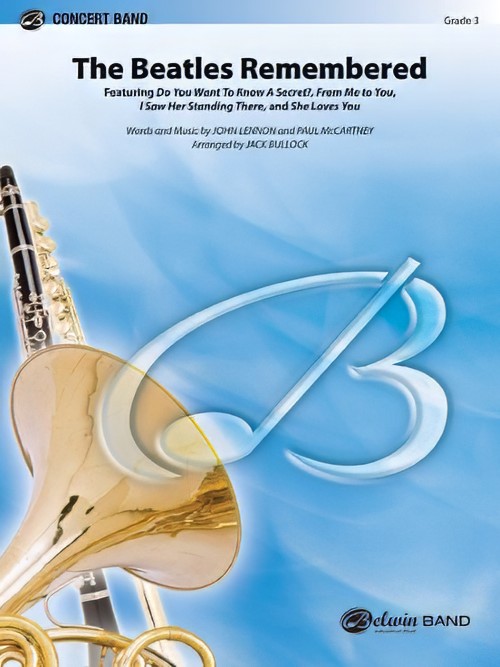 £75.00
£75.00The Beatles Remembered (Concert Band - Score and Parts) - Lennon & McCartney - Bullock, Jack
From the roots of the rock-and-roll era, this energy-packed medley brings back fond memories to those old enough, and introduces these cherished tunes to the youngsters. John, George, Ringo, and Paul! With a variety of styles to embrace the breadth of the Beatles impact on our global musical culture, the titles included are "Do You Want to Know a Secret?," "From Me to You," "I Saw Her Standing There," and "She Loves You." Clear notation, well-defined dynamics, and a groove supplied by the rhythm section in the style of the tasteful Ringo Starr, you're sure to find a warm reception for this highly crafted arrangement.Duration: 5:30
Estimated dispatch 7-14 working days
-
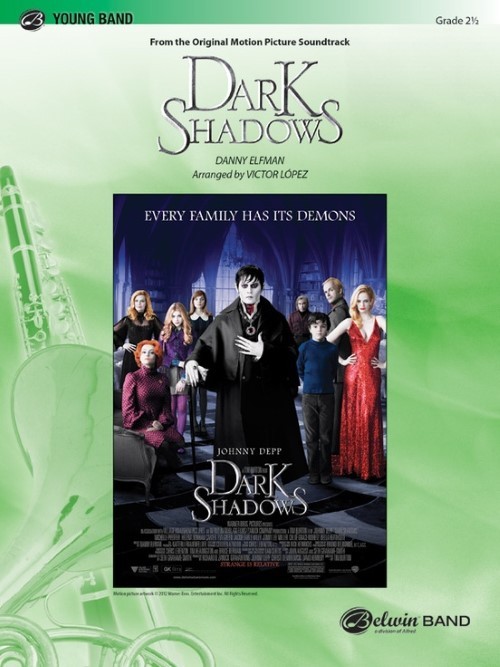 £62.95
£62.95Dark Shadows (Concert Band - Score and Parts) - Elfman, Danny - Lopez, Victor
Imagine a reluctant vampire with an irresistible allure, a mysterious ingenue who is inexorably drawn to him, a jealous vixen who is both seductress and sorceress and a strange family in a creepy old mansion with secrets around every corner. Director Tim Burton brings the cult classic series Dark Shadows to the big screen in a film featuring an all-star cast. A great opportunity to introduce cinematic soundtrack, this medley certainly depicts the intensity of Danny Elfman's original score.Duration: 4:30
Estimated dispatch 7-14 working days
-
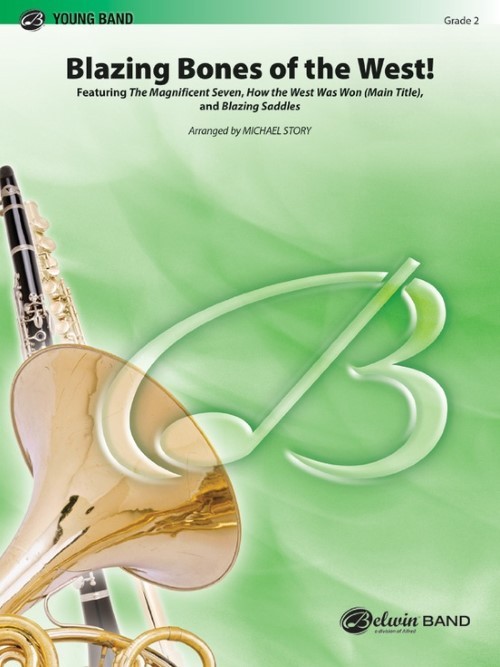 £64.50
£64.50Blazing Bones of the West! (Trombone Section Feature with Concert Band - Score and Parts) - Story, Michael
Three gallant tunes are intertwined to create this rollicking medley of three western movie themes that features your trombone section. Have your trombones stand as they perform, or better yet, bring them up in front of the band to show them off! Including "The Magnificent Seven", "How the West Was Won (Main Title)" and "Blazing Saddles", this solidly scored arrangement will bring a bit of the old west into your concert program.Duration: 3:15
Estimated dispatch 7-14 working days
-
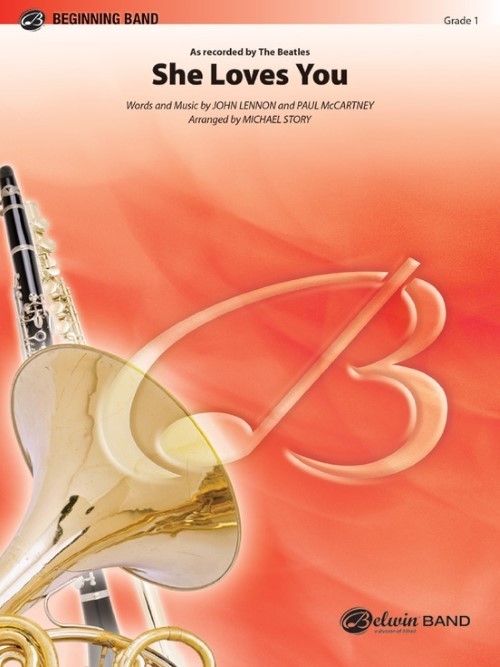 £55.00
£55.00She Loves You (Concert Band - Score and Parts) - Lennon & McCartney - Story, Michael
As recorded by the Beatles. Ranked by Rolling Stone on the top 100 songs of all time and one of the five Beatles songs all in the top five simultaneously in April of 1964, this classic rock-and-roll hit remains a real charmer. Prepared for first year students, this one will be recognized by young and old alike. Great classic rock for your first pop program.Duration: 2:15
Estimated dispatch 7-14 working days
-
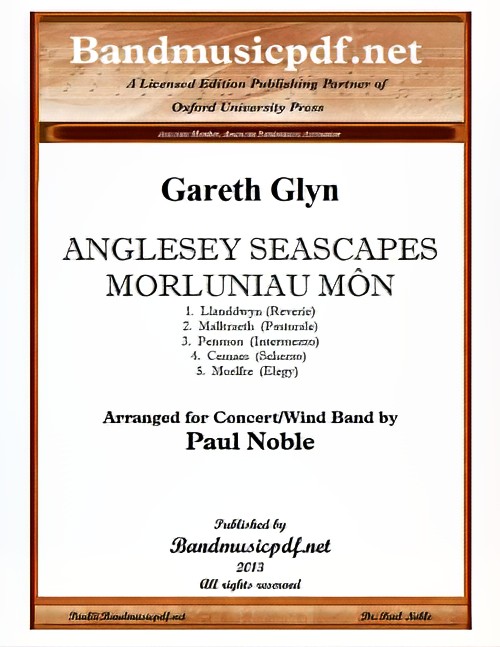 £240.00
£240.00Anglesey Seascapes (Concert Band - Score and Parts) - Glyn, Gareth - Noble, Paul
Gareth Glyn lives on the island of Anglesey, where the encircling sea has always been indivisible from the mythology, history and everyday life and work of its people. This cycle of short miniatures, in a light music vein, seeks to represent various aspects of the sea as seen from five vantagepoints around the coast of Anglesey. The whole work is bound together by recurring musical motifs which change their character according to the prevailing mood. 1. Llanddwyn (Reverie): Island of the Welsh patron saint of lovers, Dwynwen, whose marriage to Maelon was never to be, and who dedicated her life to God. 2. Malltraeth (Pastorale): A brisk walk along Cob Malltraeth, a high dyke built to keep out the sea. 3. Penmon (Intermezzo): From a vantage point by the sacred priory of St Seiriol, old sailing ships and modern yachts can be seen scudding by in Regatta week. 4. Cemaes (Scherzo): The bustle of children's play and donkey-rides on the beach in midsummer. 5. Moelfre (Elegy): In remembrance of innumerable souls lost in shipwrecks off this coast, including the Royal Charter with its loss of 452 lives.
Estimated dispatch 7-14 working days
-
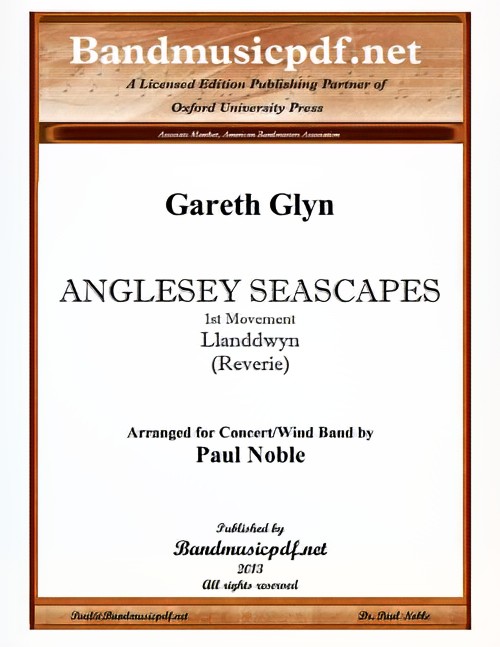 £65.00
£65.00Anglesey Seascapes, 1st Movement (Concert Band - Score and Parts) - Glyn, Gareth - Noble, Paul
Gareth Glyn lives on the island of Anglesey, where the encircling sea has always been indivisible from the mythology, history and everyday life and work of its people. This cycle of short miniatures, in a light music vein, seeks to represent various aspects of the sea as seen from five vantagepoints around the coast of Anglesey. The whole work is bound together by recurring musical motifs which change their character according to the prevailing mood. 1. Llanddwyn (Reverie): Island of the Welsh patron saint of lovers, Dwynwen, whose marriage to Maelon was never to be, and who dedicated her life to God. 2. Malltraeth (Pastorale): A brisk walk along Cob Malltraeth, a high dyke built to keep out the sea. 3. Penmon (Intermezzo): From a vantage point by the sacred priory of St Seiriol, old sailing ships and modern yachts can be seen scudding by in Regatta week. 4. Cemaes (Scherzo): The bustle of children's play and donkey-rides on the beach in midsummer. 5. Moelfre (Elegy): In remembrance of innumerable souls lost in shipwrecks off this coast, including the Royal Charter with its loss of 452 lives.
Estimated dispatch 7-14 working days
-
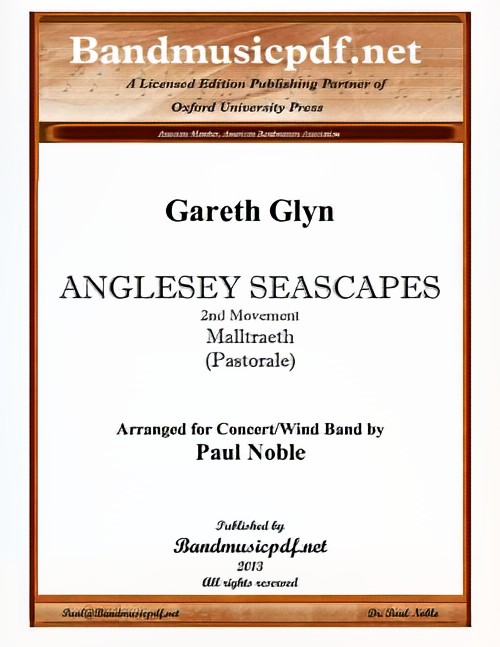 £65.00
£65.00Anglesey Seascapes, 2nd Movement (Concert Band - Score and Parts) - Glyn, Gareth - Noble, Paul
Gareth Glyn lives on the island of Anglesey, where the encircling sea has always been indivisible from the mythology, history and everyday life and work of its people. This cycle of short miniatures, in a light music vein, seeks to represent various aspects of the sea as seen from five vantagepoints around the coast of Anglesey. The whole work is bound together by recurring musical motifs which change their character according to the prevailing mood. 1. Llanddwyn (Reverie): Island of the Welsh patron saint of lovers, Dwynwen, whose marriage to Maelon was never to be, and who dedicated her life to God. 2. Malltraeth (Pastorale): A brisk walk along Cob Malltraeth, a high dyke built to keep out the sea. 3. Penmon (Intermezzo): From a vantage point by the sacred priory of St Seiriol, old sailing ships and modern yachts can be seen scudding by in Regatta week. 4. Cemaes (Scherzo): The bustle of children's play and donkey-rides on the beach in midsummer. 5. Moelfre (Elegy): In remembrance of innumerable souls lost in shipwrecks off this coast, including the Royal Charter with its loss of 452 lives.
Estimated dispatch 7-14 working days
-
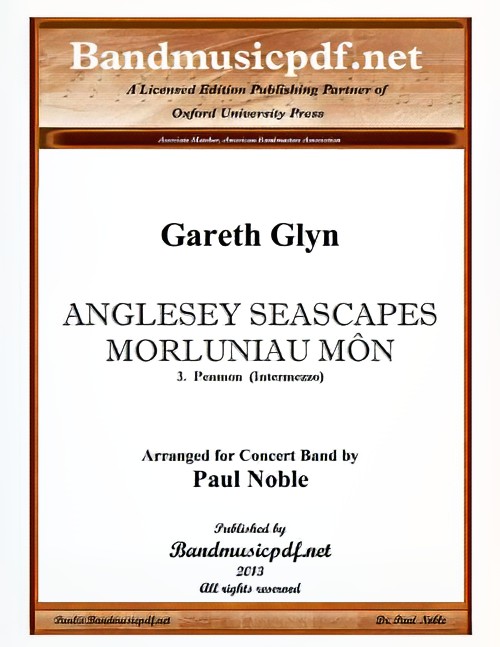 £65.00
£65.00Anglesey Seascapes, 3rd Movement (Concert Band - Score and Parts) - Glyn, Gareth - Noble, Paul
Gareth Glyn lives on the island of Anglesey, where the encircling sea has always been indivisible from the mythology, history and everyday life and work of its people. This cycle of short miniatures, in a light music vein, seeks to represent various aspects of the sea as seen from five vantagepoints around the coast of Anglesey. The whole work is bound together by recurring musical motifs which change their character according to the prevailing mood. 1. Llanddwyn (Reverie): Island of the Welsh patron saint of lovers, Dwynwen, whose marriage to Maelon was never to be, and who dedicated her life to God. 2. Malltraeth (Pastorale): A brisk walk along Cob Malltraeth, a high dyke built to keep out the sea. 3. Penmon (Intermezzo): From a vantage point by the sacred priory of St Seiriol, old sailing ships and modern yachts can be seen scudding by in Regatta week. 4. Cemaes (Scherzo): The bustle of children's play and donkey-rides on the beach in midsummer. 5. Moelfre (Elegy): In remembrance of innumerable souls lost in shipwrecks off this coast, including the Royal Charter with its loss of 452 lives.
Estimated dispatch 7-14 working days
-
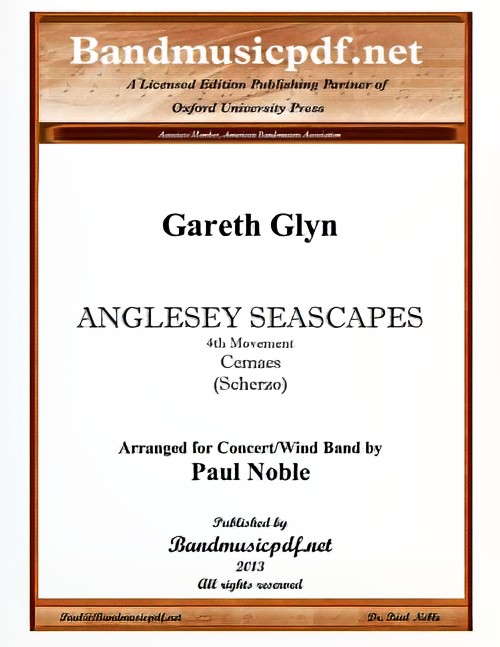 £65.00
£65.00Anglesey Seascapes, 4th Movement (Concert Band - Score and Parts) - Glyn, Gareth - Noble, Paul
Gareth Glyn lives on the island of Anglesey, where the encircling sea has always been indivisible from the mythology, history and everyday life and work of its people. This cycle of short miniatures, in a light music vein, seeks to represent various aspects of the sea as seen from five vantagepoints around the coast of Anglesey. The whole work is bound together by recurring musical motifs which change their character according to the prevailing mood. 1. Llanddwyn (Reverie): Island of the Welsh patron saint of lovers, Dwynwen, whose marriage to Maelon was never to be, and who dedicated her life to God. 2. Malltraeth (Pastorale): A brisk walk along Cob Malltraeth, a high dyke built to keep out the sea. 3. Penmon (Intermezzo): From a vantage point by the sacred priory of St Seiriol, old sailing ships and modern yachts can be seen scudding by in Regatta week. 4. Cemaes (Scherzo): The bustle of children's play and donkey-rides on the beach in midsummer. 5. Moelfre (Elegy): In remembrance of innumerable souls lost in shipwrecks off this coast, including the Royal Charter with its loss of 452 lives.
Estimated dispatch 7-14 working days
-
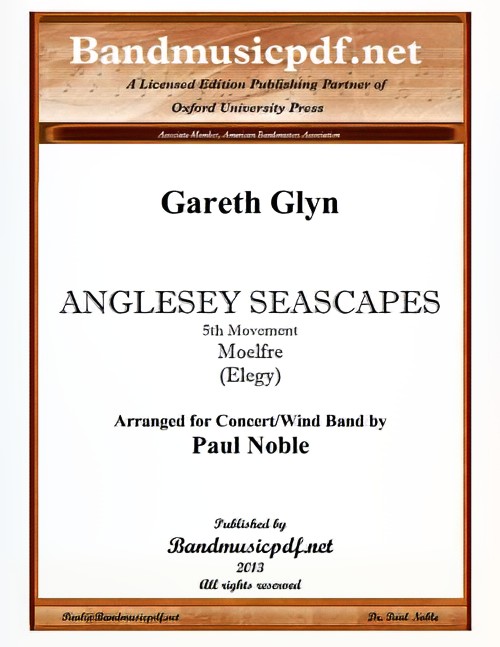 £65.00
£65.00Anglesey Seascapes, 5th Movement (Concert Band - Score and Parts) - Glyn, Gareth - Noble, Paul
Gareth Glyn lives on the island of Anglesey, where the encircling sea has always been indivisible from the mythology, history and everyday life and work of its people. This cycle of short miniatures, in a light music vein, seeks to represent various aspects of the sea as seen from five vantagepoints around the coast of Anglesey. The whole work is bound together by recurring musical motifs which change their character according to the prevailing mood. 1. Llanddwyn (Reverie): Island of the Welsh patron saint of lovers, Dwynwen, whose marriage to Maelon was never to be, and who dedicated her life to God. 2. Malltraeth (Pastorale): A brisk walk along Cob Malltraeth, a high dyke built to keep out the sea. 3. Penmon (Intermezzo): From a vantage point by the sacred priory of St Seiriol, old sailing ships and modern yachts can be seen scudding by in Regatta week. 4. Cemaes (Scherzo): The bustle of children's play and donkey-rides on the beach in midsummer. 5. Moelfre (Elegy): In remembrance of innumerable souls lost in shipwrecks off this coast, including the Royal Charter with its loss of 452 lives.
Estimated dispatch 7-14 working days
